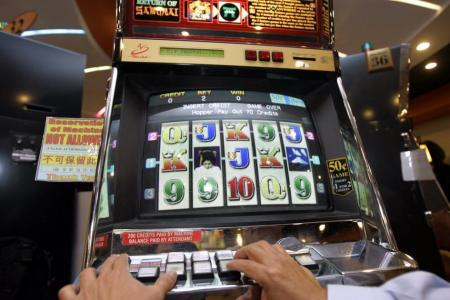Clubs must do more to curb problem gambling: Experts
It is not enough for clubs to follow just the letter of the new rules on jackpot rooms. They should be proactive in tackling problem gambling, say addiction experts.
This could include training staff to identify tell-tale signs of addiction, and programming fruit machines to stop after a certain amount of money has been spent.
Currently, clubs may voluntarily adopt the Centralised Self-Exclusion Scheme, facilitated by the National Council on Problem Gambling, where members may apply to bar themselves from the specific club. But only 25 of about 82 clubs operating such machines here have taken up the scheme.
This comes up to about 1,500 self-exclusions as of May, with individual clubs enforcing the list, said a Ministry of Social and Family Development (MSF) spokesman.
If a club detects an individual on self-exclusion inside the jackpot machine room, it must ask the individual to leave immediately, or it may be penalised under the Private Lotteries Act, said the Ministry of Home Affairs (MHA). If the individual refuses to leave, he would have committed house trespass, and the club must call the police.
Mr Billy Lee, executive director of non-profit group Blessed Grace Social Services (BGSS), said: "As the exclusion doesn't cover all the clubs, there was no point in advising people to exclude themselves from the jackpot rooms."
The situation is set to change next May, with all clubs required to offer self-exclusion - to be applied across all their fruit machine rooms. It is among measures to be rolled out in the next two years aimed at protecting individuals from the ills of gambling.
But there are limits to what regulations can do, said addiction specialist Dr Thomas Lee, noting a person can easily choose not to apply for self-exclusion. Even the new rules to restrict operating hours of jackpot rooms may not help as patrons can return another day, he said.
Operators could train some staff to look out for patrons who may be in trouble by watching for tell-tale signs, Dr Lee suggested.
Currently, some clubs like NTUC Club, HomeTeamNS and Safra offer measures such as patron education and employee training to identify problem gamblers.
Under the new regime, requirements such as restricting advertising of fruit machines and enforcing exclusions are part of the permit conditions, said MSF. After implementation, MSF will work with MHA to review and consider new measures where necessary, it said.
But BGSS' Mr Lee added that a loophole remains as gamblers can sign up as club members to use the machines. He suggested having an entry fee for fruit machine rooms.
Mr Lawrence Tan, senior psychologist at the National Addictions Management Service (Nams), said operators can take steps such as configuring machines to stop play after a length of time or if a certain sum of money has been spent. "In addition, the jackpot machines can push out personalised messages to warn patrons of risky levels of play," he said.
From 2010 to last year, about 14 per cent of the gamblers Nams saw gambled on jackpot machines.
Get The New Paper on your phone with the free TNP app. Download from the Apple App Store or Google Play Store now


